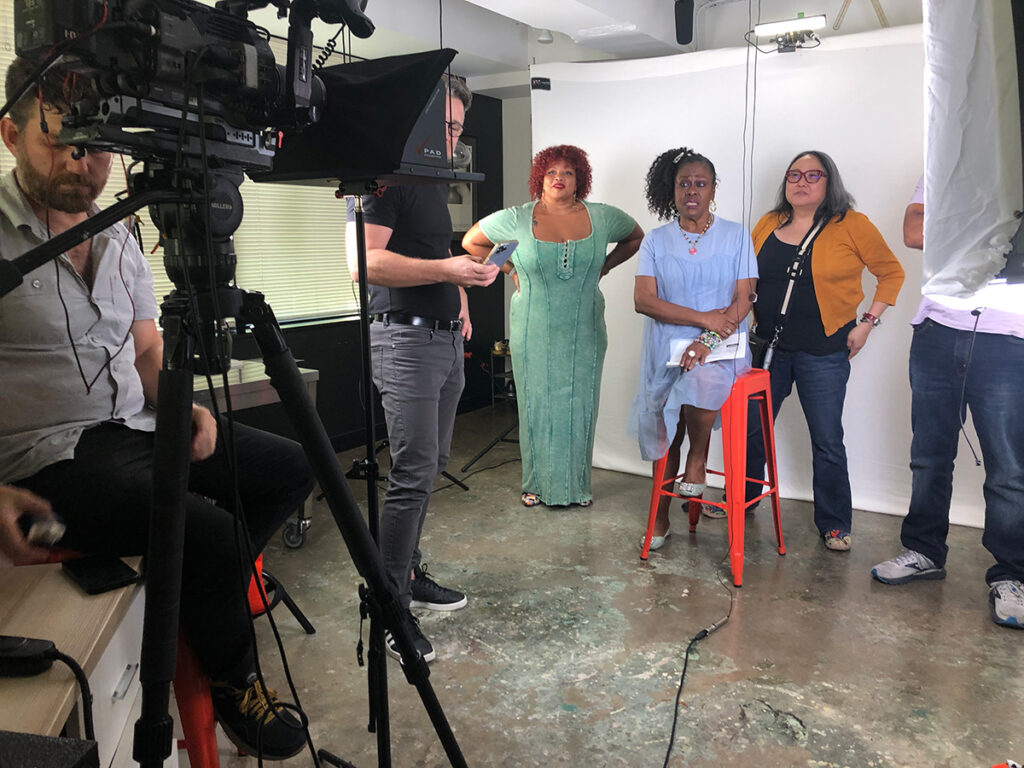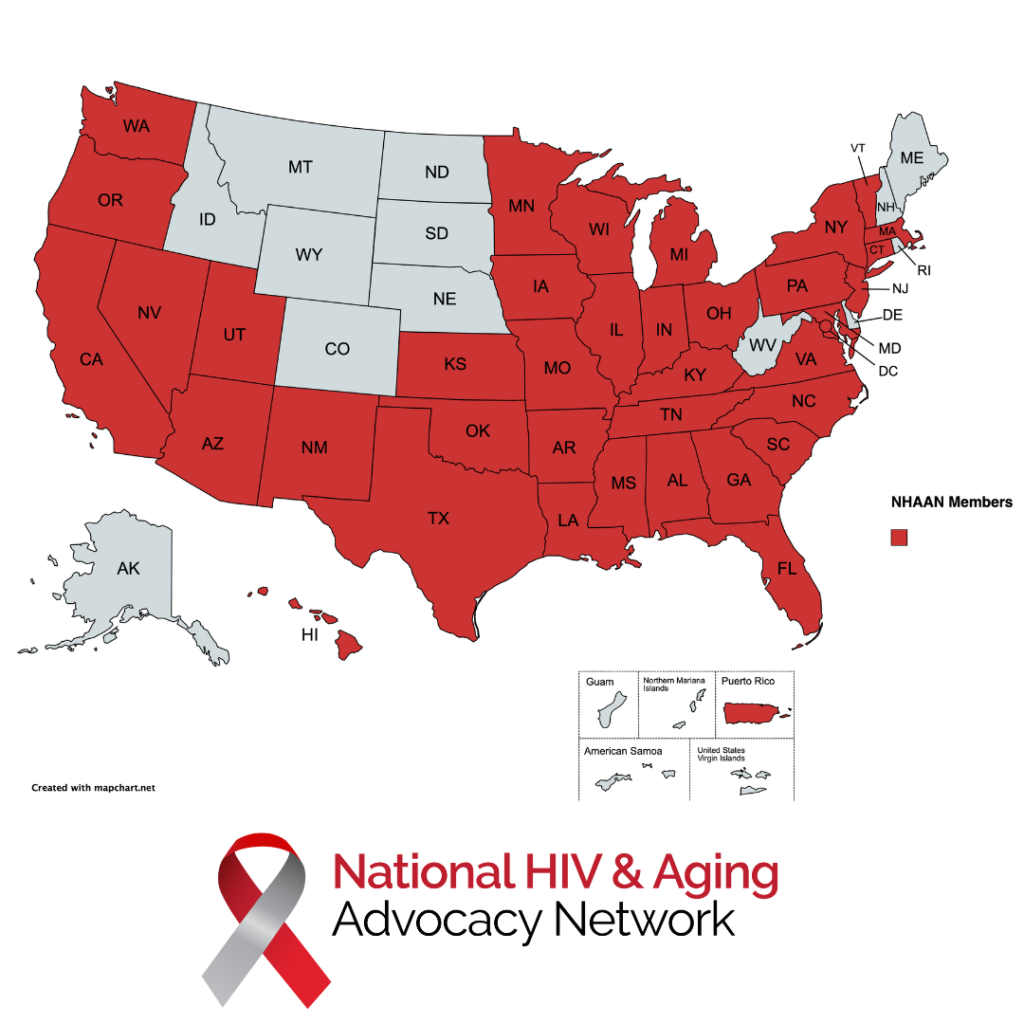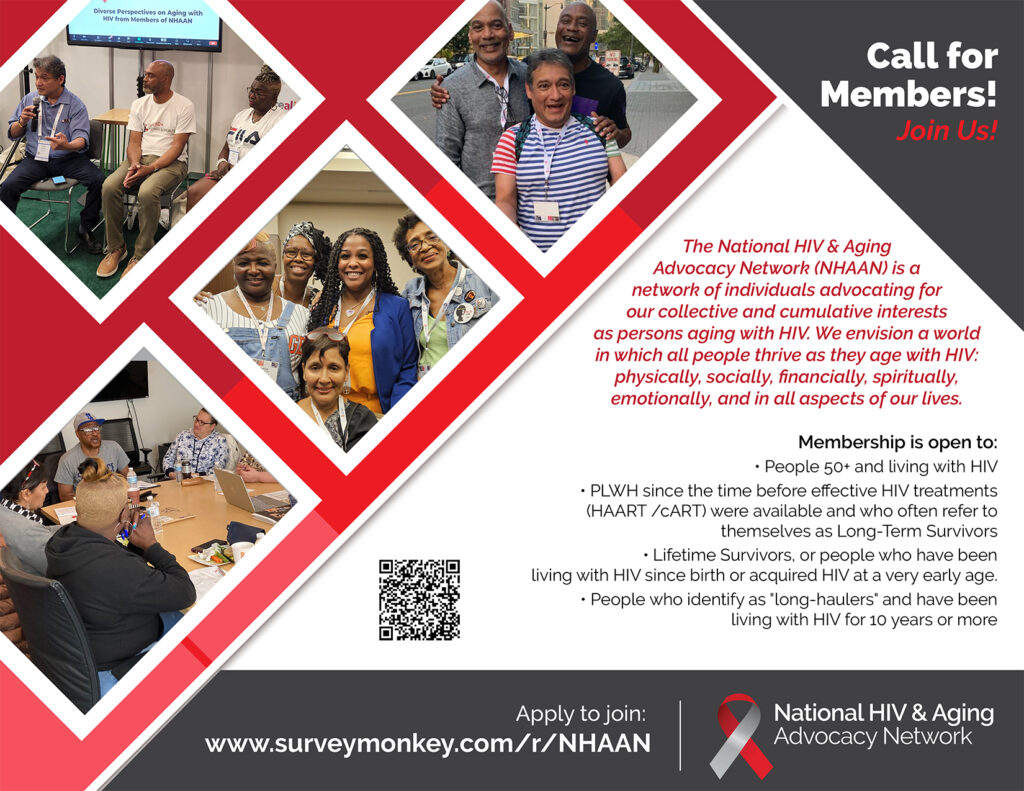
Building healthy communities
Launched in 2016, NMAC’s 50+ Strong & Healthy Program has trained leaders across the United States and Puerto Rico on how to advocate for themselves and their peers. In addition to increasing community knowledge about HIV treatments and how to manage & prevent comorbidities, this program seeks to lessen isolation, which continues to be an obstacle for people living with HIV (PLWH) over the age of 50.
Though training and webinars provide opportunities to interact with others, they build professional relationships and friendships. Social bonding is crucial to building healthy communities and the Treatment division organizes social events to strengthen the bond among the HIV 50+ cohorts.
Developing leaders & building power
NMAC’s HIV 50+ Strong & Healthy program seeks to offer people living with HIV (PLWH) who are over the age of 50 with the tools, knowledge, and opportunities to become leaders and advocates for themselves and their communities.
One way we do this is by supporting 50+ Scholars as they develop their skills in designing, implementing, and evaluating interventions and projects specifically designed for older people living with HIV (PLWH) through our mini grants program. We want Scholars to feel confident about their abilities to take on big, months-long projects, and seek additional funding opportunities to continue their work.
We also help Scholars develop their leadership skills by offering meaningful internship opportunities with NMAC’s Treatment division, and by connecting 50+ Scholars with external leadership opportunities, such as invitations to join panels and presentations, throughout the year.
Creating Social Connections
Perhaps the most important component of our program is that we help our 50+ Scholars build social connections with one another. Each year, we invite a group of PLWH over 50 and/or other Long-Term Survivors to attend our annual U.S. Conference on HIV/AIDS (USCHA). During the conference, Scholars follow the “HIV and Aging” Pathway to hear the latest research and information relevant to older adults living with HIV, in addition to attending plenaries, workshops, and institutes offering content related to aging.
We continue the community-building throughout the year with regular virtual cohort meetings and encourage participation in the virtual 50+ Strong and Healthy Group on Facebook, which boasts more than 2400 members.
2024 HIV 50+ Strong and Healthy Cohort
NMAC is pleased to announce the 2024 HIV 50+ Strong and Healthy cohort. The 50+ Strong and Healthy program launched in the summer of 2016, and the 2024 affiliate constitutes the ninth cohort, which will now run on a program year that correlates with the calendar year. Since the program’s launch, we have supported HIV and aging advocates throughout the country and Puerto Rico through projects like mini-grants, peer health education events, the National HIV and Aging Advocacy Network (NHAAN), social media campaigns, and webinars around HIV and aging topics. This year, we will continue to engage, educate, advocate, and mobilize this year’s HIV 50+ Scholars, as well as 50+ Scholars from past years.
Each year, we make sure that those selected represent the communities most impacted by the HIV epidemic. This year’s HIV 50+ cohort is comprised of older adults living with HIV and who have a demonstrated record of advocating for PLWH over the age of 50 and/or other Long-Term Survivors. As always, the cohort is made up of a mix of returning 50+ Scholars (38%) and new Scholars (62%).
- Age: 38% of this year’s cohort are in their 50s, while 50% are in their 60s. It’s important to support these leaders because the majority of PLWH today are in their 50s and by 2030 some estimates project that more than 70% of PLWH will be over the age of 50.
- Gender: From the selected group of 50+ Scholars, 42% are women, while 57% are men. TGNC and Two-Spirit folks made up 15% of selected Scholars.
- Sexual orientation: 58% of the cohort is made up of people who identify as LGBTQ+ and 42% of people identify as heterosexual. We are excited that 15% of this year’s cohort are heterosexual men living with HIV.
- Geography: Scholars represent 15 different states, and 42% of those folks live in the Southern United States, NMAC’s focus this year at USCHA 2024.
Race/Ethnicity: NMAC knows the highest burden of HIV is carried by Black people and other people of color. 46% of this year’s 50+ cohort is Black/African American, 30% is Latinx, 11% is White, 8% is Native American/Alaska Native, and 4% is AAPI. Black women make up 26% of the cohort, the largest of any group. Black men (19%) and Latinx men (19%) are the next two largest groups of Scholars.
Meet the 50+ Strong and Healthy Program’s 2024 Cohort
Paul A. Aguilar
Paul A. Aguilar
Erick Arturo Lopez Delgado
Erick Arturo Lopez Delgado
Yolanda Bell
Yolanda Bell
Von Biggs
Von Biggs
Ivette Chavez Gonzalez
Ivette Chavez Gonzalez
Juan Chumpitaz
Juan Chumpitaz
John Curry
John Curry
Paul Edmonds
Paul Edmonds
Antonio Elmore
Antonio Elmore
Arlene Frames
Arlene Frames
Bernardo Gomez
Bernardo Gomez
Bill Hall
Bill Hall
Tiffany Hartman-Stroud
Tiffany Hartman-Stroud
Monica Johnson
Monica Johnson
Evonne Kaho
Evonne Kaho
Eddie Lowry
Eddie Lowry
Mary Lucero-Hill
Mary Lucero-Hill
Greg Mahusay
Greg Mahusay
Eugenia Rogers
Eugenia Rogers
Yolanda Ross
Yolanda Ross
Andy Roybal
Andy Roybal
Reggie Stroud
Reggie Stroud
Nathan Townsend
Nathan Townsend
Victor Velazquez
Victor Velazquez
Jo Ann Vertetis
Jo Ann Vertetis
Just Launched! HIV 50+ Community Education Project
NMAC is continuing the long tradition of bringing treatment and science to communities most affected by the HIV/AIDS epidemic with the 2024 launch of NMAC’s HIV 50+ Community Education Project.
Purpose:
This virtual learning platform will include trainings that cover topics such as HIV and diabetes, cardiovascular health, mental health, and HIV-Associated Neurocognitive Disorder (HAND). It is designed to help PLWH over 50 and their providers better understand how to manage and prevent the most common co-occurring conditions for LTS and older adults living with HIV.
Community-centric:
One goal of these trainings is connecting older adults LWH and other Long-Term Survivors to resources locally and nationally that will help them live a healthier and more vibrant life. We believe in the power of grassroots advocacy and activism and our Policy & Advocacy training also encourages participants to apply for membership to our grassroots National HIV/Aging Advocacy Network (NHAAN).
Access:
Taught by peer educators, the HIV 50+ Community Education Project will be open to 50+ Scholars and alumni. Beginning in 2025, we will expand access to NMAC members.
Advocating for Older Adults Living with HIV and Long-Term Survivors (LTS)
NMAC’s Treatment Division takes a leading role in advocacy coalitions, such as co-organizing the Federal AIDS Policy Partnership (FAPP)’s HIV and Aging Working Group, collaborating with international HIV and aging partners to support the Silver Zone, a networking zone for LTS at AIDS 22, and working with US PLHIV Caucus, AIDS United, SAGE, The Reunion Project, and ROC4Aging+ to organize community listening sessions at AIDSWatch and USCHA.
Federal AIDS Policy Partnership’s HIV and Aging Working Group, collaborating with international HIV and aging partners to support the Silver Zone, a networking zone for LTS at AIDS 22, and working with US PLHIV Caucus, AIDS United, SAGE, and ROC4Aging+ to organize community listening sessions at AIDSWatch and USCHA.
At the core of all our work is educating our constituents, allies, and decisionmakers, on the policy needs of LTS and older adults LWH. We do that through our 50+ webinar series, and via our HIV and aging pathway at USCHA each year.
We also regularly collaborate with NMAC’s Strategic Partnerships & Policy division to support policies that will benefit older adults living with HIV and Long term Survivors, such as expanding the Older Americans Act to include PLWH as a designated group of highest social need.
Survivor Thriver Stories
Resource: National HIV & Aging Advocacy Network (NHAAN)
Launched in 2019, the National HIV & Aging Advocacy Network (NHAAN) is a grassroots network of individuals advocating for the collective and cumulative interests of people aging with HIV. The Network envisions a world in which all people thrive as they age with HIV: physically, socially, financially, spiritually, emotionally, and in all aspects of their lives.
Purpose of the Network
- Serves a training space for Long-Term Survivors and older adults LWH, and NHAAN members can expect to receive training in policy and advocacy fundamentals, social media advocacy, virtual community organizing, meeting facilitation, among other skills
- Organizes meetings between NHAAN members and policy makers, federal officials, elder justice organizations, and other HIV advocates
- Advocates for various policy priorities that directly impact the lives of older PLWH and LTS.
Network Membership Eligibility:
- People living with HIV who are 50 and older
- People living with HIV since the time before effective HIV treatments (HAART/cART) were available
- Lifetime Survivors/Dandelions
- People who have been living with HIV for 10 years or more
NHAAN currently counts 260+ members from 37 states, D.C., and Puerto Rico, and anyone interested can apply for membership here: www.surveymonkey.com/r/NHAAN



